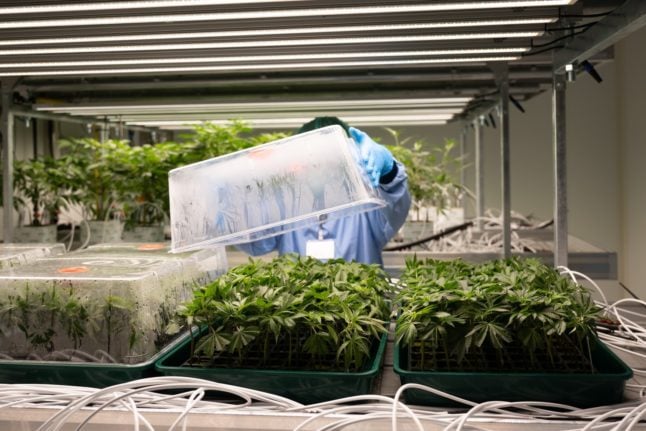Why is Germany's cannabis draft law so controversial?

On Wednesday Germany's cabinet approved a 184-page draft law on legalising cannabis use in Germany. While the law was already watered down, it’s come up against critique from both sides of the debate.
The German government approved a draft law Wednesday legalising the purchase and possession of small amounts of cannabis for recreational use, despite criticism from opposition politicians and judges.
The bill, which still needs to go through parliament, is expected to come into force by the end of the year.
According to the current plans, cannabis should be removed from the list of prohibited substances in Germany's Narcotics Act. From the age of 18, possession of up to 25 grams would be allowed, and a maximum of three cannabis plants could be grown privately.
Non-profit ‘social clubs’, capped at a maximum of 500 members, would be allowed to collectively grow cannabis for “recreational purposes” and only distribute it to members for their own consumption. The minimum age to join such an association would be 18.
The government has already scrapped plans to allow the widespread sale of cannabis in licensed stores for the time being, following EU concerns.
In April, the coalition government unveiled a compromise: a two-stage plan that would still allow adults to possess cannabis in small amounts but wouldn't allow it to be sold in pharmacies and other shops nationwide.
READ ALSO: EXPLAINED: What you need to know about Germany’s plans to legalise cannabis
Why are so many supporters unhappy?
The fact that cannabis use could be exempt from punishment should actually be reason for supporters of legalisation to rejoice. But for many of them, the draft law is still too restrictive.
The Hanfverband Deutschland (German Hemp Association) thinks there is "no logically comprehensible reason to treat the smoking of cannabis differently from the smoking of tobacco," it said in a statement on Wednesday.
They also called the idea of prohibiting consumption in cannabis clubs "completely unrealistic and also nonsensical".
The association even consider the minimum distance rules which would apply to schools and Kitas (day-care centres) "unconstitutional".
Moreover, they fear that the black market cannot be "effectively dried up" nationwide without the introduction of licensed specialised shops, as was proposed in the original draft legislation.
READ ALSO: INTERVIEW: 'This is the year of cannabis legalisation in Germany'

A protester smokes a joint during a cannabis legalisation demo in Berlin. Photo: picture alliance/dpa | Annette Riedl
Why are so many opponents dissatisfied?
For the opponents of legalisation, on the other hand, the draft bill goes too far. Centre-right Christian Democratic (CDU) member of parliament Stephan Pilsinger fears more risky consumption behaviour.
"Those who consume cannabis for non-medical reasons, those who abuse cannabis, are risking their health," he said in a recent speech to the Bundestag.
The Federal Chamber of Psychotherapists stressed that the reform makes "credible addiction prevention and access to addiction treatment more difficult."
The German Farmers' Association is also sceptical: cannabis remains "a niche product with many hurdles in cultivation and a high security effort," they said in a statement on Wednesday.
Cannabis used for medicinal purposes has been allowed in Germany since 2017, though many have criticised the tedious process for patients to get a hold of the substance.
Traffic issues?
According to federal police (GdP) chairman Jochen Kopelke, the proposed law would cause major problems for the police who would have to take on more enforcement work to be sure all of the rules laid-out in the law were met.
Saxony's prime minister Armin Schuster (CDU) also expressed fears that the black market would grow and road safety would suffer.
"This law will involve a complete loss of control," Schuster told the editorial network Germany (RND).
But German Transport Minister Volker Wissing of the Liberals (FDP) is calling for cannabis limits for drivers, similar to those already set for alcohol.
"We are examining how a limit for cannabis can be determined and created on a scientific basis within the framework of the administrative offense provision of Section 24a of the Road Traffic Act," which stipulates the blood alcohol limit for alcohol, a ministry spokeswoman told Bild on Wednesday.

An employee with medicinal cannabis plants at Domecan in Ebersbach, Saxony in March 2022. Photo: picture alliance/dpa/dpa-Zentralbild | Sebastian Kahnert
Kopelke also lamented that a "sufficiently long transitional phase" in the draft law was missing, which would "inevitably lead to massive uncertainties, if not conflicts between authorities and the population".
To mollify critics, the German Association of Judges declared that the many special rules for cannabis clubs and for the cultivation and sale of the drug, which are to come with legalisation, would have to be checked and violations punished.
German Minister of Justice Marco Buschmann (FDP) told the newspapers of the Funke media group on Wednesday that he supported the new draft law, which could be a new more forward-thinking chapter for Germany's drug policy.
"I am very confident that a more pragmatic drug policy will lead to relief for the courts... if people can buy and consume cannabis legally."
Comments
See Also
The German government approved a draft law Wednesday legalising the purchase and possession of small amounts of cannabis for recreational use, despite criticism from opposition politicians and judges.
The bill, which still needs to go through parliament, is expected to come into force by the end of the year.
According to the current plans, cannabis should be removed from the list of prohibited substances in Germany's Narcotics Act. From the age of 18, possession of up to 25 grams would be allowed, and a maximum of three cannabis plants could be grown privately.
Non-profit ‘social clubs’, capped at a maximum of 500 members, would be allowed to collectively grow cannabis for “recreational purposes” and only distribute it to members for their own consumption. The minimum age to join such an association would be 18.
The government has already scrapped plans to allow the widespread sale of cannabis in licensed stores for the time being, following EU concerns.
In April, the coalition government unveiled a compromise: a two-stage plan that would still allow adults to possess cannabis in small amounts but wouldn't allow it to be sold in pharmacies and other shops nationwide.
READ ALSO: EXPLAINED: What you need to know about Germany’s plans to legalise cannabis
Why are so many supporters unhappy?
The fact that cannabis use could be exempt from punishment should actually be reason for supporters of legalisation to rejoice. But for many of them, the draft law is still too restrictive.
The Hanfverband Deutschland (German Hemp Association) thinks there is "no logically comprehensible reason to treat the smoking of cannabis differently from the smoking of tobacco," it said in a statement on Wednesday.
They also called the idea of prohibiting consumption in cannabis clubs "completely unrealistic and also nonsensical".
The association even consider the minimum distance rules which would apply to schools and Kitas (day-care centres) "unconstitutional".
Moreover, they fear that the black market cannot be "effectively dried up" nationwide without the introduction of licensed specialised shops, as was proposed in the original draft legislation.
READ ALSO: INTERVIEW: 'This is the year of cannabis legalisation in Germany'

Why are so many opponents dissatisfied?
For the opponents of legalisation, on the other hand, the draft bill goes too far. Centre-right Christian Democratic (CDU) member of parliament Stephan Pilsinger fears more risky consumption behaviour.
"Those who consume cannabis for non-medical reasons, those who abuse cannabis, are risking their health," he said in a recent speech to the Bundestag.
The Federal Chamber of Psychotherapists stressed that the reform makes "credible addiction prevention and access to addiction treatment more difficult."
The German Farmers' Association is also sceptical: cannabis remains "a niche product with many hurdles in cultivation and a high security effort," they said in a statement on Wednesday.
Cannabis used for medicinal purposes has been allowed in Germany since 2017, though many have criticised the tedious process for patients to get a hold of the substance.
Traffic issues?
According to federal police (GdP) chairman Jochen Kopelke, the proposed law would cause major problems for the police who would have to take on more enforcement work to be sure all of the rules laid-out in the law were met.
Saxony's prime minister Armin Schuster (CDU) also expressed fears that the black market would grow and road safety would suffer.
"This law will involve a complete loss of control," Schuster told the editorial network Germany (RND).
But German Transport Minister Volker Wissing of the Liberals (FDP) is calling for cannabis limits for drivers, similar to those already set for alcohol.
"We are examining how a limit for cannabis can be determined and created on a scientific basis within the framework of the administrative offense provision of Section 24a of the Road Traffic Act," which stipulates the blood alcohol limit for alcohol, a ministry spokeswoman told Bild on Wednesday.

Kopelke also lamented that a "sufficiently long transitional phase" in the draft law was missing, which would "inevitably lead to massive uncertainties, if not conflicts between authorities and the population".
To mollify critics, the German Association of Judges declared that the many special rules for cannabis clubs and for the cultivation and sale of the drug, which are to come with legalisation, would have to be checked and violations punished.
German Minister of Justice Marco Buschmann (FDP) told the newspapers of the Funke media group on Wednesday that he supported the new draft law, which could be a new more forward-thinking chapter for Germany's drug policy.
"I am very confident that a more pragmatic drug policy will lead to relief for the courts... if people can buy and consume cannabis legally."
Join the conversation in our comments section below. Share your own views and experience and if you have a question or suggestion for our journalists then email us at [email protected].
Please keep comments civil, constructive and on topic – and make sure to read our terms of use before getting involved.
Please log in here to leave a comment.